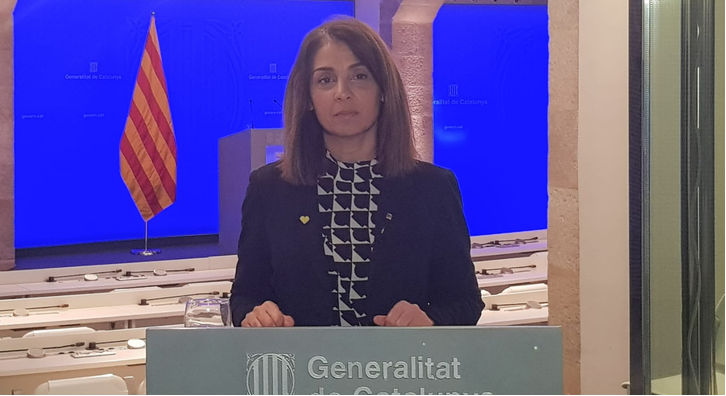- The decree includes measures to continue public procurement, which is key to maintaining jobs in service providers; €7.5 million has been allocated to support self-employed workers forced to interrupt their activity
- The Catalan government has requested that the central government authorise a full lockdown of Catalonia
- Minister Buch asked the public not to use the 112 emergency line for general coronavirus questions
- Minister Vergés: “We’re preparing to maximise the capacity of the health system”

The Catalan government has approved a second decree on urgent measures to counteract the effects of the Covid-19 pandemic on various aspects of the Catalan economy. The resolution adopted today includes a second round of measures that focus on public procurement, health and management of medical waste, transparency, public transport and tax administration.
Information on the current situation and the latest measures to tackle the coronavirus crisis was provided today in a press conference following today’s meeting of the Executive Council. The briefing was given by the Minister of the Presidency and government spokesperson, Meritxell Budó; the Minister of Home Affairs, Miquel Buch; and the Minister of Health, Alba Vergés.
With respect to taxation, the decree provides for a moratorium on self-assessment deadlines and the payment of all taxes for which the Government of Catalonia is responsible (to remain in effect until the state of emergency ends).
The decree also provides for the allocation of up to €7.5 million to compensate losses suffered by self-employed workers due to the coronavirus crisis.
With regard to public procurement, the government intends to ensure that companies which provide services for the Generalitat continue to be paid and can maintain jobs even if they are unable to provide the contracted service. Specifically, the Catalan government will bear expenses related to the salaries and insurance policies of staff of affected companies from the date on which the closure of facilities was ordered.
Spokesperson Budó said the Economic Recovery Working Group would meet this afternoon, with the participation of President Torra, Vice-President Aragonès and key ministers. “We’re working to identify the most effective and immediate measures to deal with the fallout of this crisis; for example, measures to ensure the liquidity of companies and protect jobs, and moratoriums on the payment of social security contributions by companies and self-employed workers.”
Minister Buch asks public not to use 112 line for general coronavirus questions
The Minister of the Home Office urged the public not to use the 112 emergency line for general queries. “If we collapse the service, we won’t be able to respond to emergencies,” he warned.
As for mobility, Buch said that since 6 March there has been a 49.3% reduction in the number of vehicles exiting the metropolitan area of Barcelona and a 53.2% drop in entries. The minister said this was 13% less than the previous day.
The minister also reported that under a special plan for dealing with the Covid-19 outbreak, the Catalan police have written up official reports on seven establishments and closed another 12. Reports have also been written up on 141 individuals, and 1051 have been identified by the police.
Buch said that Catalonia was functioning normally despite home confinement measures and stressed the need for the central government to take “immediate” decisions in line with a proposal put forward by the Catalan government. “We hope to receive a response from the Spanish government as soon as possible so that we can put into effect a resolution we signed yesterday that aims to prevent the spread of the disease. We sent the resolution yesterday afternoon but still don’t have a reply.”
“We’re preparing to maximise the capacity of the health system”
The Minister of Health, Alba Vergés, reiterated that the best way to curb the spread of the coronavirus and ease pressure of the health system is for people to remain confined at home. “This is the best way to break the transmission chain and ensure that people can be cared for safely and effectively,” she said. According to the minister, the government is preparing to “maximise the capacity of the health system”. She said that to accomplish this it is important to have in place territorial contingency plans as well as plans for the use of hospitals and the adaptation of existing spaces.
The health minister said the biggest concern is patients in serious condition, who will require more resources, including intensive care units and semi-critical resources. Vergés said that the goal was to maximise available capacity. “We have access to the resources of Catalonia’s private health system as well as the public system. Both are now under the coordination of the Catalan Health Service.”
The minister said Catalonia will soon receive more medical supplies. “We’ve already received supplies but will soon be getting more because we started placing orders on the first day of the crisis. We’ll be receiving six million surgical masks for people who’ve tested positive for the coronavirus. This is in on top of any centralised purchasing by the state.” The minister said the Igualada Hospital is one of the centres being prioritised when it comes to providing medical supplies. The city of Igualada is the focal point of the coronavirus outbreak in Catalonia.
Finally, Vergés said an app that soon to be made available will enable citizens to report cases with symptoms and their location: “With this information, we’ll be able to monitor hotspots and make better decisions.” The minister also said the possibility of using rapid detection tests will be considered if they become available.